Westminster Business School: Managerial Escalator Career Path Analysis
VerifiedAdded on 2023/04/22
|12
|2218
|125
Report
AI Summary
This report, prepared for the University of Westminster's Westminster Business School module 'The Role of the Manager' (4HURM007W), examines the career paths of two managers in relation to the Managerial Escalator model. The report begins with an abstract and table of contents, followed by an introduction that defines the Managerial Escalator and its relevance to career progression. The main body of the report presents findings from interviews with a marketing manager and a manager head of manufacturing, detailing their career trajectories, responsibilities, and experiences. The interviews explore how their paths align with the managerial escalator concept, including their initial roles, promotions, challenges faced, and managerial styles. The report concludes by discussing the implications of the Managerial Escalator model and reflecting on the findings in relation to the student's own career aspirations. The report also includes references and appendices containing the interview questions and contact details of the interviewees.
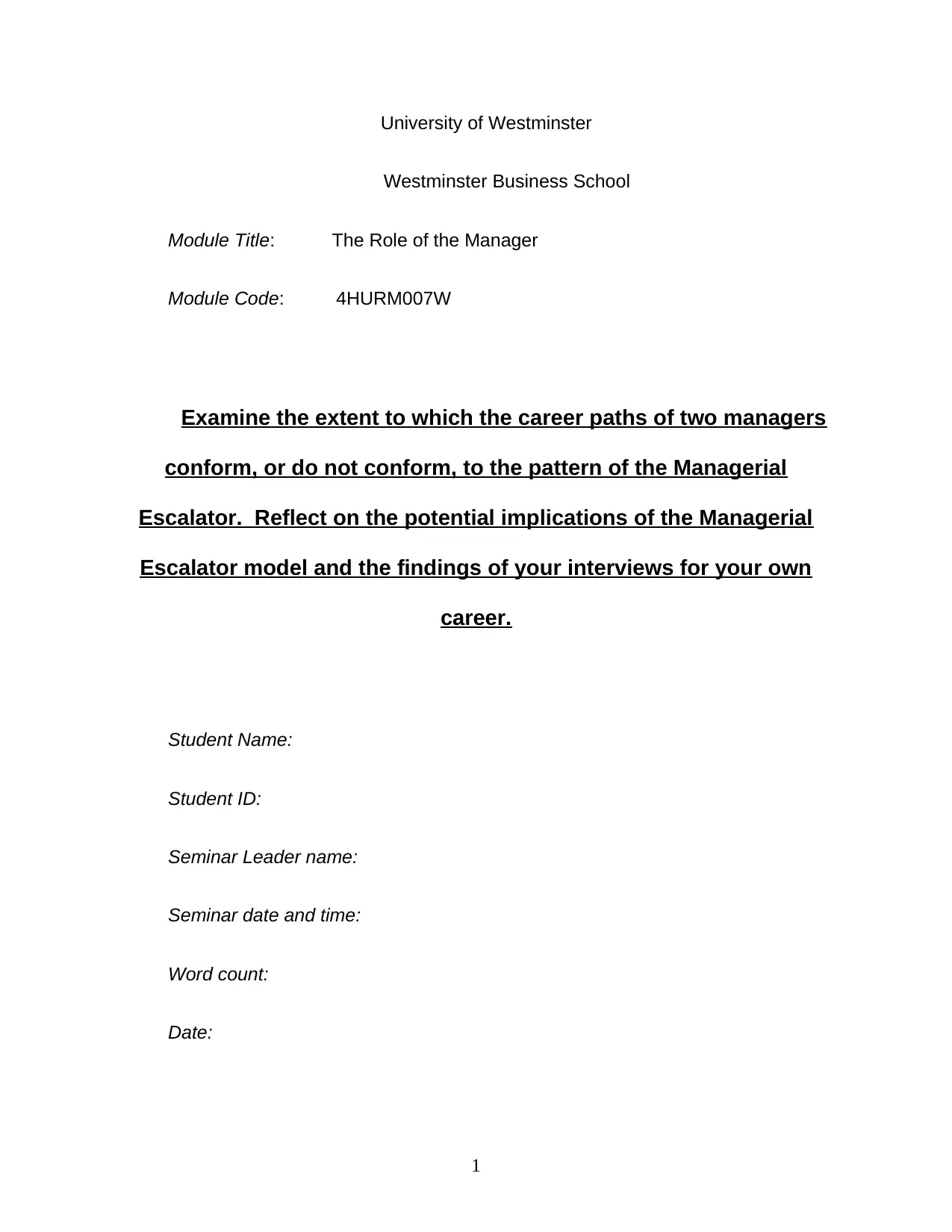
University of Westminster
Westminster Business School
Module Title: The Role of the Manager
Module Code: 4HURM007W
Examine the extent to which the career paths of two managers
conform, or do not conform, to the pattern of the Managerial
Escalator. Reflect on the potential implications of the Managerial
Escalator model and the findings of your interviews for your own
career.
Student Name:
Student ID:
Seminar Leader name:
Seminar date and time:
Word count:
Date:
1
Westminster Business School
Module Title: The Role of the Manager
Module Code: 4HURM007W
Examine the extent to which the career paths of two managers
conform, or do not conform, to the pattern of the Managerial
Escalator. Reflect on the potential implications of the Managerial
Escalator model and the findings of your interviews for your own
career.
Student Name:
Student ID:
Seminar Leader name:
Seminar date and time:
Word count:
Date:
1
Paraphrase This Document
Need a fresh take? Get an instant paraphrase of this document with our AI Paraphraser
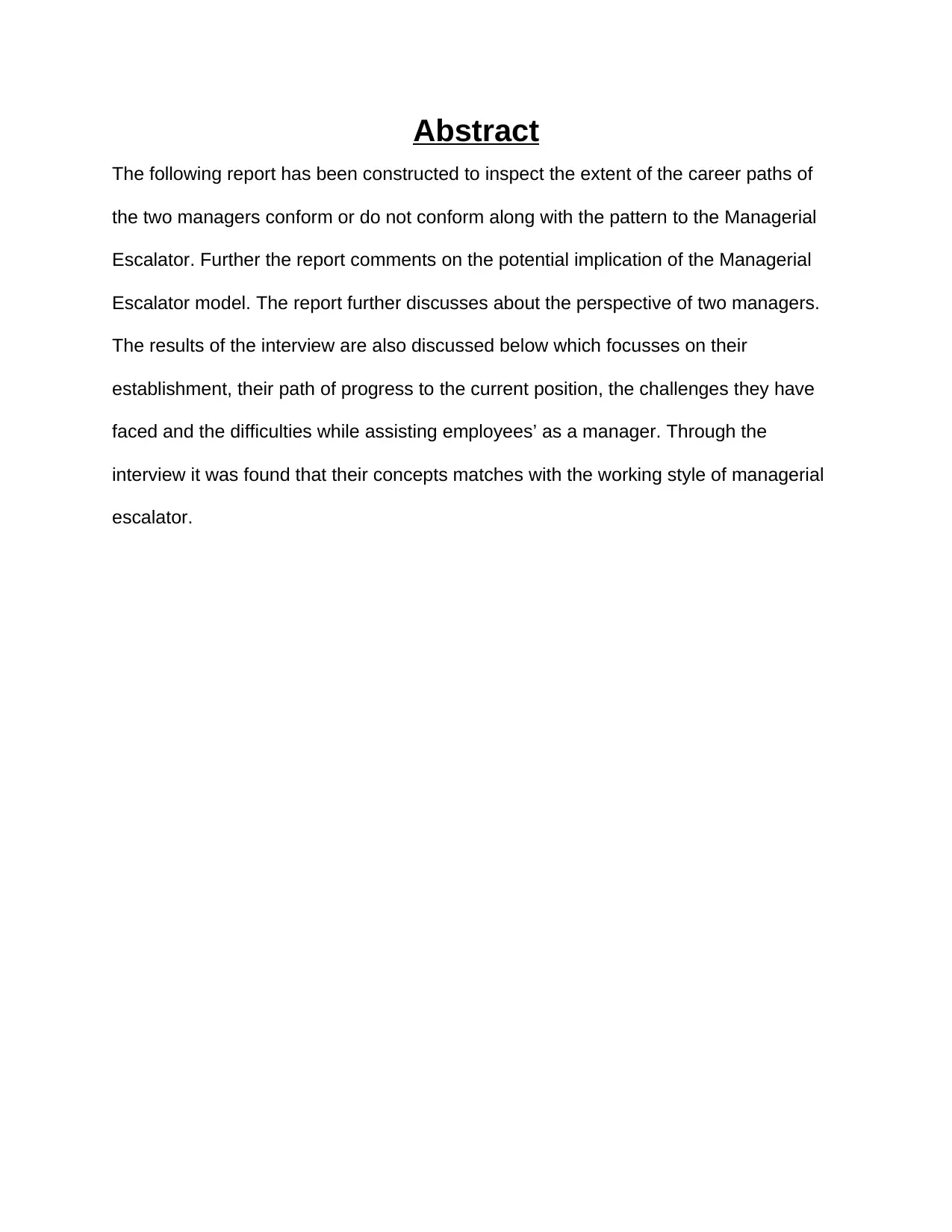
Abstract
The following report has been constructed to inspect the extent of the career paths of
the two managers conform or do not conform along with the pattern to the Managerial
Escalator. Further the report comments on the potential implication of the Managerial
Escalator model. The report further discusses about the perspective of two managers.
The results of the interview are also discussed below which focusses on their
establishment, their path of progress to the current position, the challenges they have
faced and the difficulties while assisting employees’ as a manager. Through the
interview it was found that their concepts matches with the working style of managerial
escalator.
The following report has been constructed to inspect the extent of the career paths of
the two managers conform or do not conform along with the pattern to the Managerial
Escalator. Further the report comments on the potential implication of the Managerial
Escalator model. The report further discusses about the perspective of two managers.
The results of the interview are also discussed below which focusses on their
establishment, their path of progress to the current position, the challenges they have
faced and the difficulties while assisting employees’ as a manager. Through the
interview it was found that their concepts matches with the working style of managerial
escalator.
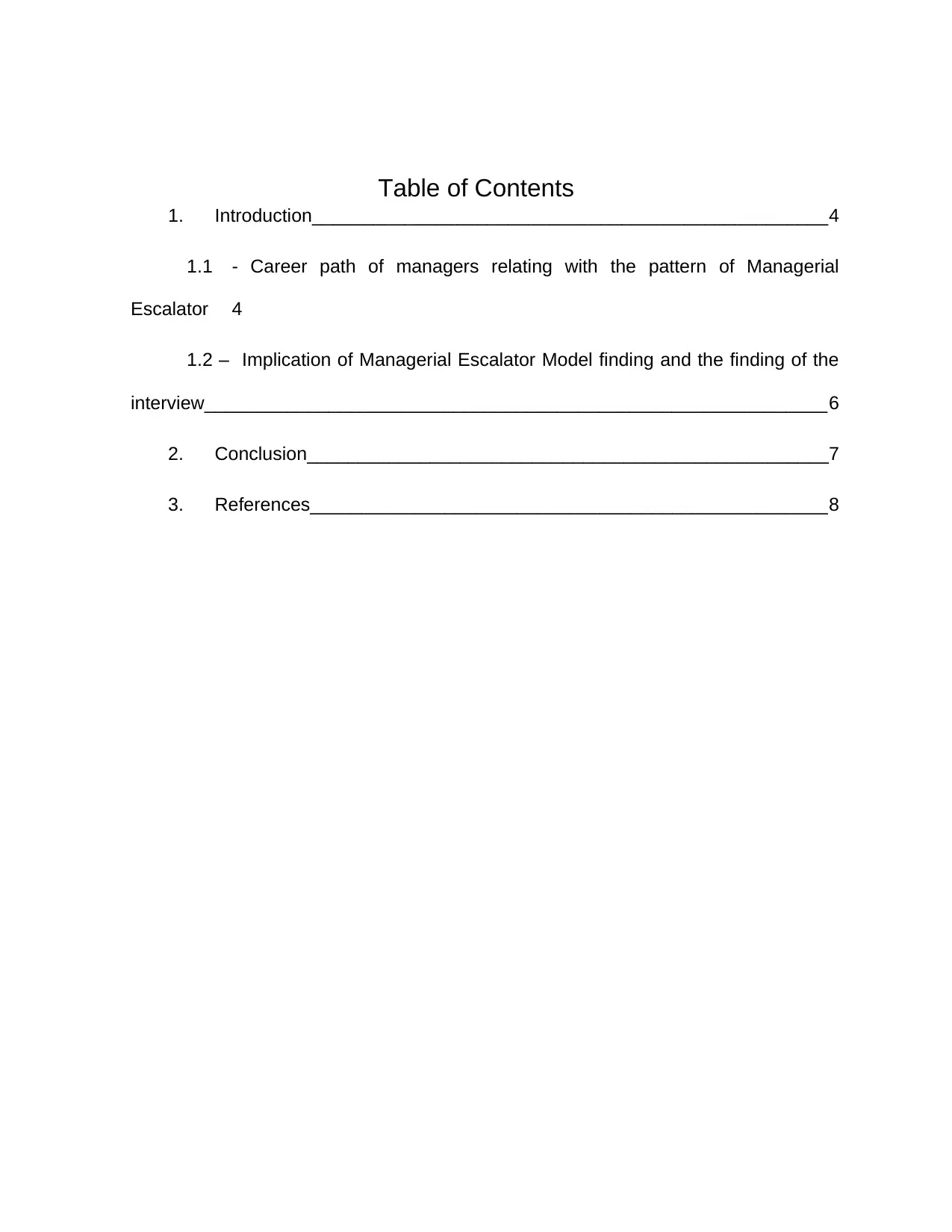
Table of Contents
1. Introduction__________________________________________________4
1.1 - Career path of managers relating with the pattern of Managerial
Escalator 4
1.2 – Implication of Managerial Escalator Model finding and the finding of the
interview____________________________________________________________6
2. Conclusion___________________________________________________7
3. References__________________________________________________8
1. Introduction__________________________________________________4
1.1 - Career path of managers relating with the pattern of Managerial
Escalator 4
1.2 – Implication of Managerial Escalator Model finding and the finding of the
interview____________________________________________________________6
2. Conclusion___________________________________________________7
3. References__________________________________________________8
⊘ This is a preview!⊘
Do you want full access?
Subscribe today to unlock all pages.

Trusted by 1+ million students worldwide
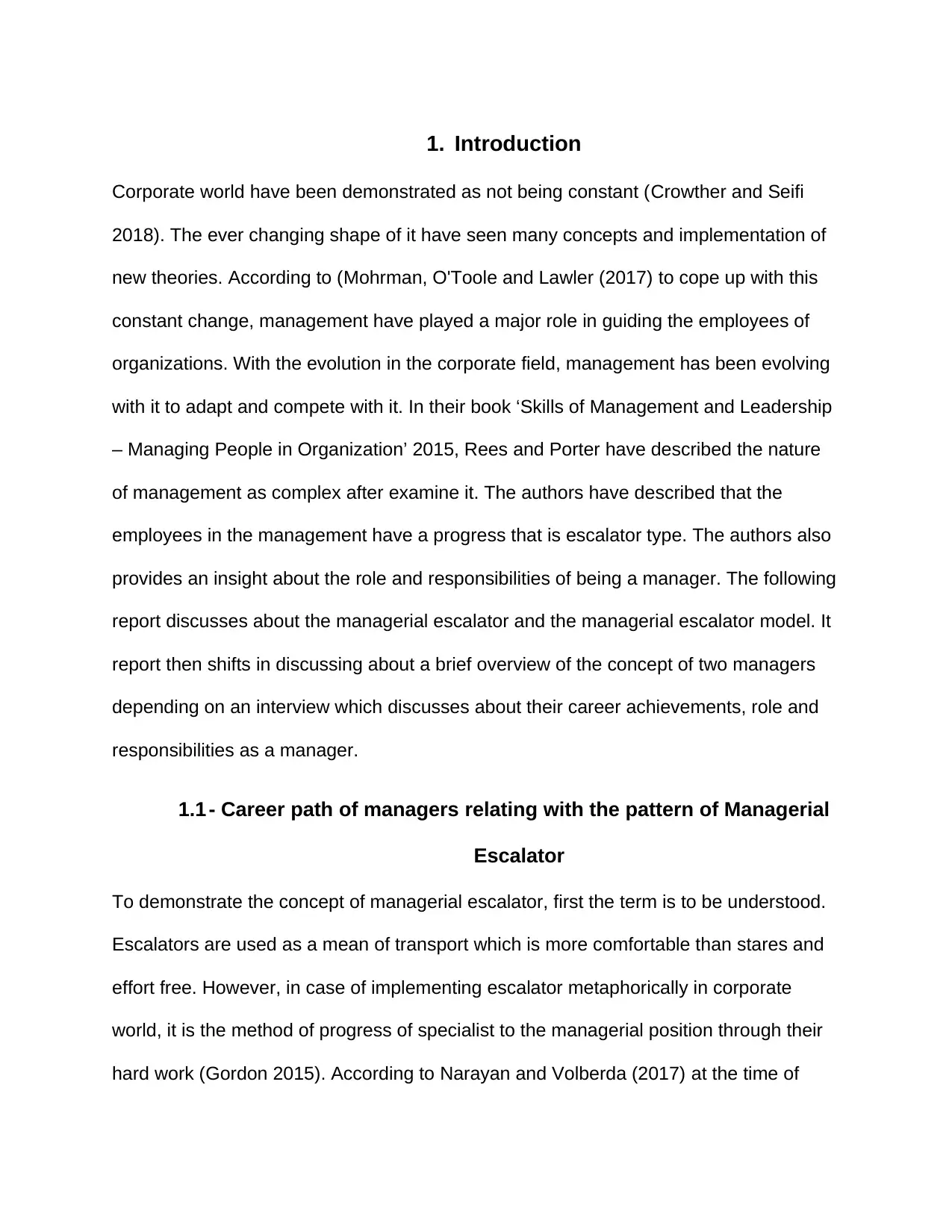
1. Introduction
Corporate world have been demonstrated as not being constant (Crowther and Seifi
2018). The ever changing shape of it have seen many concepts and implementation of
new theories. According to (Mohrman, O'Toole and Lawler (2017) to cope up with this
constant change, management have played a major role in guiding the employees of
organizations. With the evolution in the corporate field, management has been evolving
with it to adapt and compete with it. In their book ‘Skills of Management and Leadership
– Managing People in Organization’ 2015, Rees and Porter have described the nature
of management as complex after examine it. The authors have described that the
employees in the management have a progress that is escalator type. The authors also
provides an insight about the role and responsibilities of being a manager. The following
report discusses about the managerial escalator and the managerial escalator model. It
report then shifts in discussing about a brief overview of the concept of two managers
depending on an interview which discusses about their career achievements, role and
responsibilities as a manager.
1.1 - Career path of managers relating with the pattern of Managerial
Escalator
To demonstrate the concept of managerial escalator, first the term is to be understood.
Escalators are used as a mean of transport which is more comfortable than stares and
effort free. However, in case of implementing escalator metaphorically in corporate
world, it is the method of progress of specialist to the managerial position through their
hard work (Gordon 2015). According to Narayan and Volberda (2017) at the time of
Corporate world have been demonstrated as not being constant (Crowther and Seifi
2018). The ever changing shape of it have seen many concepts and implementation of
new theories. According to (Mohrman, O'Toole and Lawler (2017) to cope up with this
constant change, management have played a major role in guiding the employees of
organizations. With the evolution in the corporate field, management has been evolving
with it to adapt and compete with it. In their book ‘Skills of Management and Leadership
– Managing People in Organization’ 2015, Rees and Porter have described the nature
of management as complex after examine it. The authors have described that the
employees in the management have a progress that is escalator type. The authors also
provides an insight about the role and responsibilities of being a manager. The following
report discusses about the managerial escalator and the managerial escalator model. It
report then shifts in discussing about a brief overview of the concept of two managers
depending on an interview which discusses about their career achievements, role and
responsibilities as a manager.
1.1 - Career path of managers relating with the pattern of Managerial
Escalator
To demonstrate the concept of managerial escalator, first the term is to be understood.
Escalators are used as a mean of transport which is more comfortable than stares and
effort free. However, in case of implementing escalator metaphorically in corporate
world, it is the method of progress of specialist to the managerial position through their
hard work (Gordon 2015). According to Narayan and Volberda (2017) at the time of
Paraphrase This Document
Need a fresh take? Get an instant paraphrase of this document with our AI Paraphraser
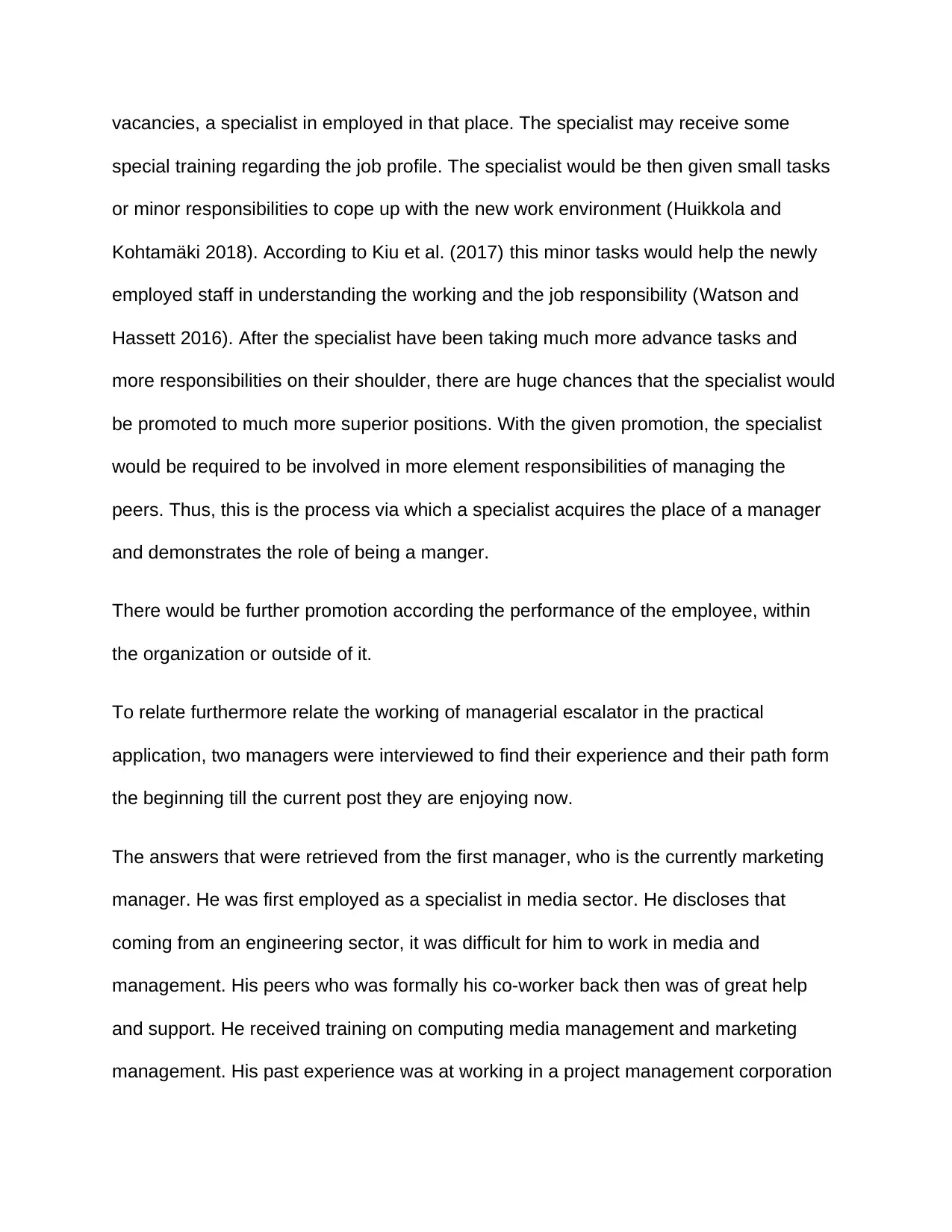
vacancies, a specialist in employed in that place. The specialist may receive some
special training regarding the job profile. The specialist would be then given small tasks
or minor responsibilities to cope up with the new work environment (Huikkola and
Kohtamäki 2018). According to Kiu et al. (2017) this minor tasks would help the newly
employed staff in understanding the working and the job responsibility (Watson and
Hassett 2016). After the specialist have been taking much more advance tasks and
more responsibilities on their shoulder, there are huge chances that the specialist would
be promoted to much more superior positions. With the given promotion, the specialist
would be required to be involved in more element responsibilities of managing the
peers. Thus, this is the process via which a specialist acquires the place of a manager
and demonstrates the role of being a manger.
There would be further promotion according the performance of the employee, within
the organization or outside of it.
To relate furthermore relate the working of managerial escalator in the practical
application, two managers were interviewed to find their experience and their path form
the beginning till the current post they are enjoying now.
The answers that were retrieved from the first manager, who is the currently marketing
manager. He was first employed as a specialist in media sector. He discloses that
coming from an engineering sector, it was difficult for him to work in media and
management. His peers who was formally his co-worker back then was of great help
and support. He received training on computing media management and marketing
management. His past experience was at working in a project management corporation
special training regarding the job profile. The specialist would be then given small tasks
or minor responsibilities to cope up with the new work environment (Huikkola and
Kohtamäki 2018). According to Kiu et al. (2017) this minor tasks would help the newly
employed staff in understanding the working and the job responsibility (Watson and
Hassett 2016). After the specialist have been taking much more advance tasks and
more responsibilities on their shoulder, there are huge chances that the specialist would
be promoted to much more superior positions. With the given promotion, the specialist
would be required to be involved in more element responsibilities of managing the
peers. Thus, this is the process via which a specialist acquires the place of a manager
and demonstrates the role of being a manger.
There would be further promotion according the performance of the employee, within
the organization or outside of it.
To relate furthermore relate the working of managerial escalator in the practical
application, two managers were interviewed to find their experience and their path form
the beginning till the current post they are enjoying now.
The answers that were retrieved from the first manager, who is the currently marketing
manager. He was first employed as a specialist in media sector. He discloses that
coming from an engineering sector, it was difficult for him to work in media and
management. His peers who was formally his co-worker back then was of great help
and support. He received training on computing media management and marketing
management. His past experience was at working in a project management corporation
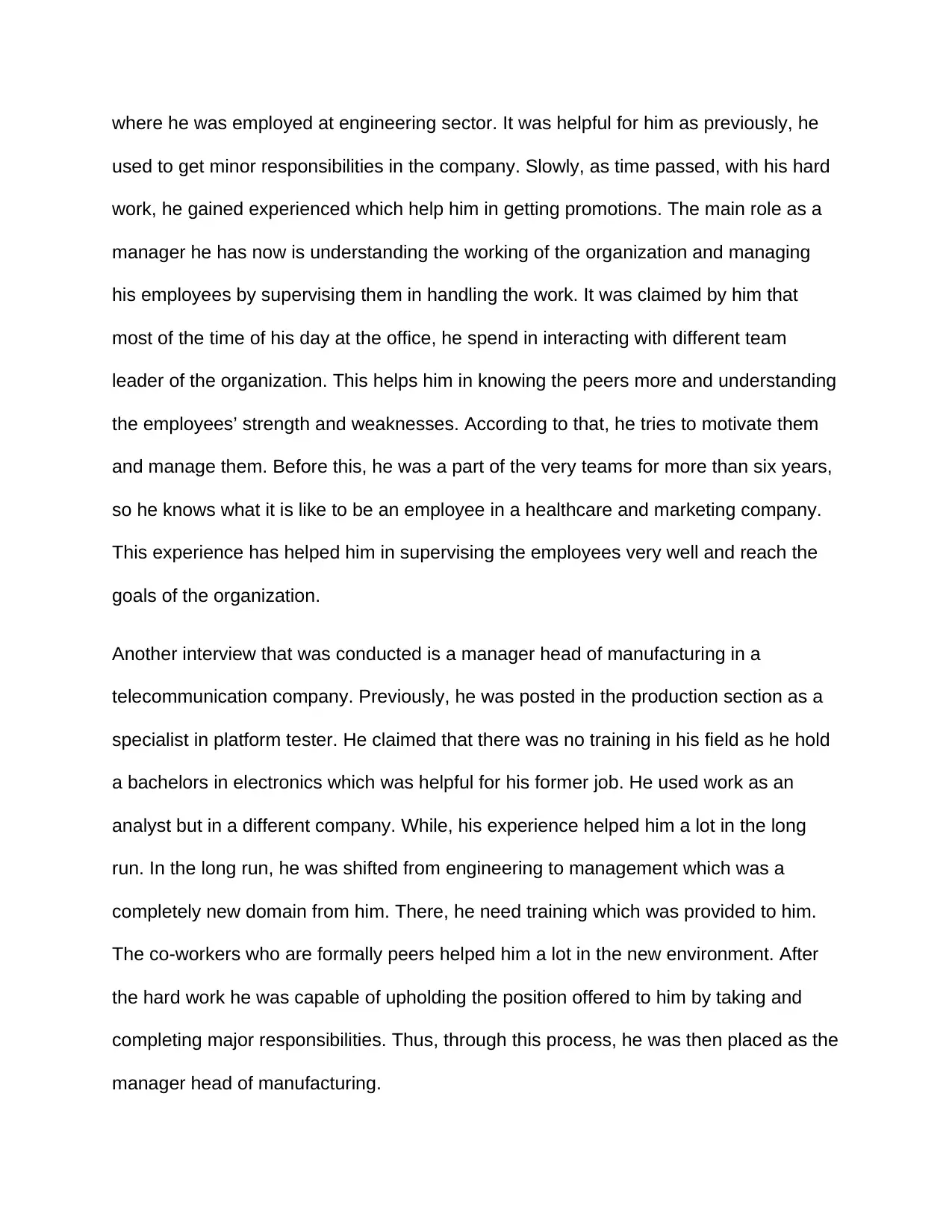
where he was employed at engineering sector. It was helpful for him as previously, he
used to get minor responsibilities in the company. Slowly, as time passed, with his hard
work, he gained experienced which help him in getting promotions. The main role as a
manager he has now is understanding the working of the organization and managing
his employees by supervising them in handling the work. It was claimed by him that
most of the time of his day at the office, he spend in interacting with different team
leader of the organization. This helps him in knowing the peers more and understanding
the employees’ strength and weaknesses. According to that, he tries to motivate them
and manage them. Before this, he was a part of the very teams for more than six years,
so he knows what it is like to be an employee in a healthcare and marketing company.
This experience has helped him in supervising the employees very well and reach the
goals of the organization.
Another interview that was conducted is a manager head of manufacturing in a
telecommunication company. Previously, he was posted in the production section as a
specialist in platform tester. He claimed that there was no training in his field as he hold
a bachelors in electronics which was helpful for his former job. He used work as an
analyst but in a different company. While, his experience helped him a lot in the long
run. In the long run, he was shifted from engineering to management which was a
completely new domain from him. There, he need training which was provided to him.
The co-workers who are formally peers helped him a lot in the new environment. After
the hard work he was capable of upholding the position offered to him by taking and
completing major responsibilities. Thus, through this process, he was then placed as the
manager head of manufacturing.
used to get minor responsibilities in the company. Slowly, as time passed, with his hard
work, he gained experienced which help him in getting promotions. The main role as a
manager he has now is understanding the working of the organization and managing
his employees by supervising them in handling the work. It was claimed by him that
most of the time of his day at the office, he spend in interacting with different team
leader of the organization. This helps him in knowing the peers more and understanding
the employees’ strength and weaknesses. According to that, he tries to motivate them
and manage them. Before this, he was a part of the very teams for more than six years,
so he knows what it is like to be an employee in a healthcare and marketing company.
This experience has helped him in supervising the employees very well and reach the
goals of the organization.
Another interview that was conducted is a manager head of manufacturing in a
telecommunication company. Previously, he was posted in the production section as a
specialist in platform tester. He claimed that there was no training in his field as he hold
a bachelors in electronics which was helpful for his former job. He used work as an
analyst but in a different company. While, his experience helped him a lot in the long
run. In the long run, he was shifted from engineering to management which was a
completely new domain from him. There, he need training which was provided to him.
The co-workers who are formally peers helped him a lot in the new environment. After
the hard work he was capable of upholding the position offered to him by taking and
completing major responsibilities. Thus, through this process, he was then placed as the
manager head of manufacturing.
⊘ This is a preview!⊘
Do you want full access?
Subscribe today to unlock all pages.

Trusted by 1+ million students worldwide
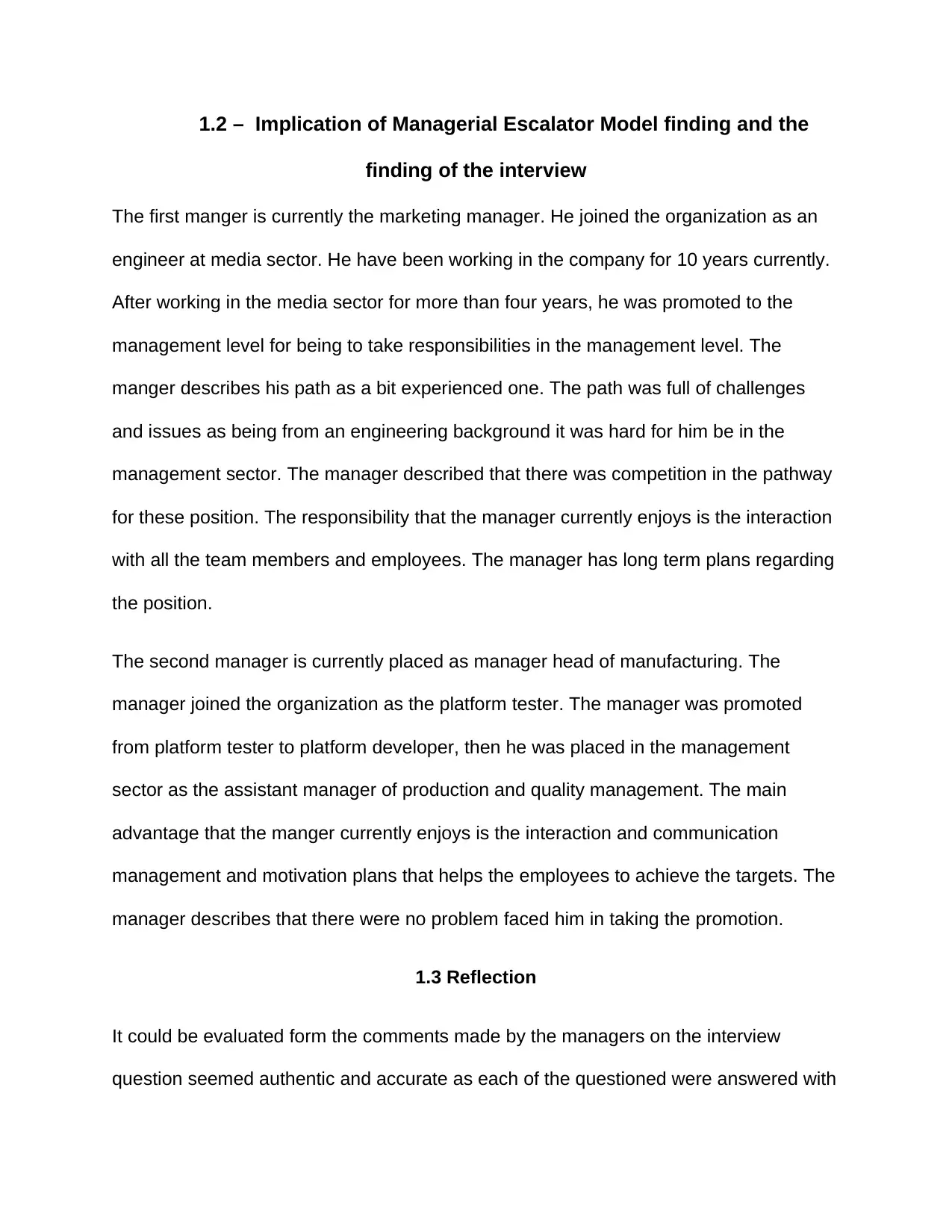
1.2 – Implication of Managerial Escalator Model finding and the
finding of the interview
The first manger is currently the marketing manager. He joined the organization as an
engineer at media sector. He have been working in the company for 10 years currently.
After working in the media sector for more than four years, he was promoted to the
management level for being to take responsibilities in the management level. The
manger describes his path as a bit experienced one. The path was full of challenges
and issues as being from an engineering background it was hard for him be in the
management sector. The manager described that there was competition in the pathway
for these position. The responsibility that the manager currently enjoys is the interaction
with all the team members and employees. The manager has long term plans regarding
the position.
The second manager is currently placed as manager head of manufacturing. The
manager joined the organization as the platform tester. The manager was promoted
from platform tester to platform developer, then he was placed in the management
sector as the assistant manager of production and quality management. The main
advantage that the manger currently enjoys is the interaction and communication
management and motivation plans that helps the employees to achieve the targets. The
manager describes that there were no problem faced him in taking the promotion.
1.3 Reflection
It could be evaluated form the comments made by the managers on the interview
question seemed authentic and accurate as each of the questioned were answered with
finding of the interview
The first manger is currently the marketing manager. He joined the organization as an
engineer at media sector. He have been working in the company for 10 years currently.
After working in the media sector for more than four years, he was promoted to the
management level for being to take responsibilities in the management level. The
manger describes his path as a bit experienced one. The path was full of challenges
and issues as being from an engineering background it was hard for him be in the
management sector. The manager described that there was competition in the pathway
for these position. The responsibility that the manager currently enjoys is the interaction
with all the team members and employees. The manager has long term plans regarding
the position.
The second manager is currently placed as manager head of manufacturing. The
manager joined the organization as the platform tester. The manager was promoted
from platform tester to platform developer, then he was placed in the management
sector as the assistant manager of production and quality management. The main
advantage that the manger currently enjoys is the interaction and communication
management and motivation plans that helps the employees to achieve the targets. The
manager describes that there were no problem faced him in taking the promotion.
1.3 Reflection
It could be evaluated form the comments made by the managers on the interview
question seemed authentic and accurate as each of the questioned were answered with
Paraphrase This Document
Need a fresh take? Get an instant paraphrase of this document with our AI Paraphraser
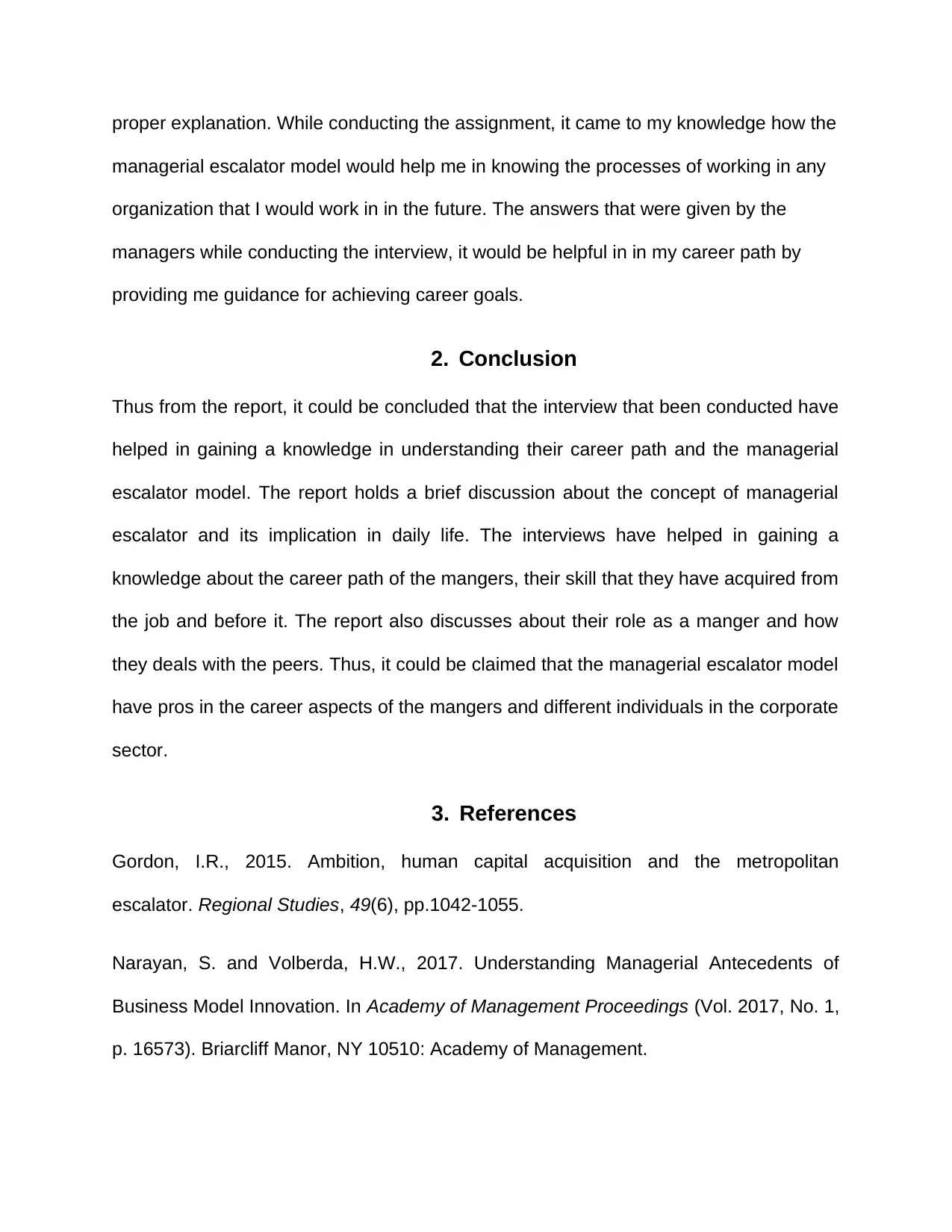
proper explanation. While conducting the assignment, it came to my knowledge how the
managerial escalator model would help me in knowing the processes of working in any
organization that I would work in in the future. The answers that were given by the
managers while conducting the interview, it would be helpful in in my career path by
providing me guidance for achieving career goals.
2. Conclusion
Thus from the report, it could be concluded that the interview that been conducted have
helped in gaining a knowledge in understanding their career path and the managerial
escalator model. The report holds a brief discussion about the concept of managerial
escalator and its implication in daily life. The interviews have helped in gaining a
knowledge about the career path of the mangers, their skill that they have acquired from
the job and before it. The report also discusses about their role as a manger and how
they deals with the peers. Thus, it could be claimed that the managerial escalator model
have pros in the career aspects of the mangers and different individuals in the corporate
sector.
3. References
Gordon, I.R., 2015. Ambition, human capital acquisition and the metropolitan
escalator. Regional Studies, 49(6), pp.1042-1055.
Narayan, S. and Volberda, H.W., 2017. Understanding Managerial Antecedents of
Business Model Innovation. In Academy of Management Proceedings (Vol. 2017, No. 1,
p. 16573). Briarcliff Manor, NY 10510: Academy of Management.
managerial escalator model would help me in knowing the processes of working in any
organization that I would work in in the future. The answers that were given by the
managers while conducting the interview, it would be helpful in in my career path by
providing me guidance for achieving career goals.
2. Conclusion
Thus from the report, it could be concluded that the interview that been conducted have
helped in gaining a knowledge in understanding their career path and the managerial
escalator model. The report holds a brief discussion about the concept of managerial
escalator and its implication in daily life. The interviews have helped in gaining a
knowledge about the career path of the mangers, their skill that they have acquired from
the job and before it. The report also discusses about their role as a manger and how
they deals with the peers. Thus, it could be claimed that the managerial escalator model
have pros in the career aspects of the mangers and different individuals in the corporate
sector.
3. References
Gordon, I.R., 2015. Ambition, human capital acquisition and the metropolitan
escalator. Regional Studies, 49(6), pp.1042-1055.
Narayan, S. and Volberda, H.W., 2017. Understanding Managerial Antecedents of
Business Model Innovation. In Academy of Management Proceedings (Vol. 2017, No. 1,
p. 16573). Briarcliff Manor, NY 10510: Academy of Management.
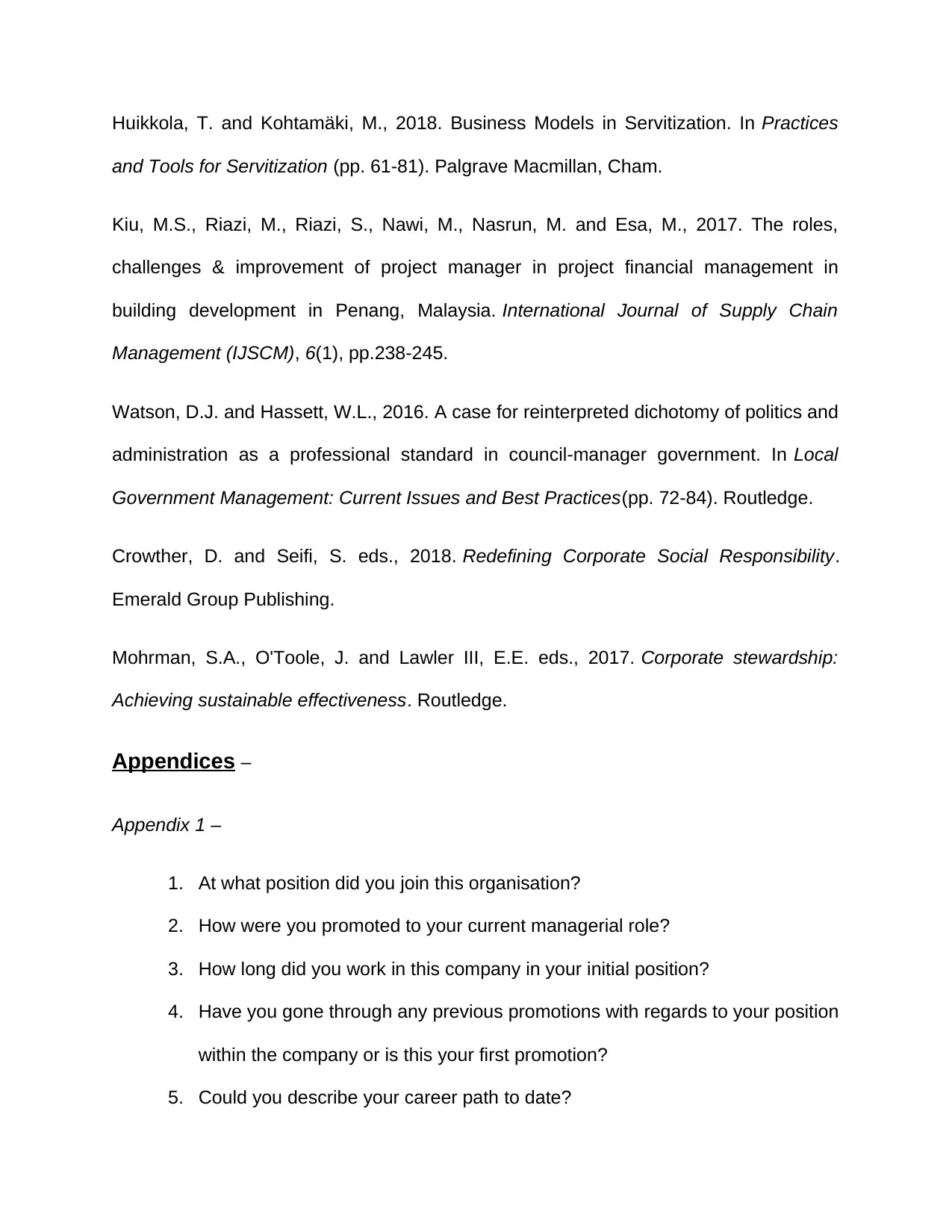
Huikkola, T. and Kohtamäki, M., 2018. Business Models in Servitization. In Practices
and Tools for Servitization (pp. 61-81). Palgrave Macmillan, Cham.
Kiu, M.S., Riazi, M., Riazi, S., Nawi, M., Nasrun, M. and Esa, M., 2017. The roles,
challenges & improvement of project manager in project financial management in
building development in Penang, Malaysia. International Journal of Supply Chain
Management (IJSCM), 6(1), pp.238-245.
Watson, D.J. and Hassett, W.L., 2016. A case for reinterpreted dichotomy of politics and
administration as a professional standard in council-manager government. In Local
Government Management: Current Issues and Best Practices(pp. 72-84). Routledge.
Crowther, D. and Seifi, S. eds., 2018. Redefining Corporate Social Responsibility.
Emerald Group Publishing.
Mohrman, S.A., O'Toole, J. and Lawler III, E.E. eds., 2017. Corporate stewardship:
Achieving sustainable effectiveness. Routledge.
Appendices –
Appendix 1 –
1. At what position did you join this organisation?
2. How were you promoted to your current managerial role?
3. How long did you work in this company in your initial position?
4. Have you gone through any previous promotions with regards to your position
within the company or is this your first promotion?
5. Could you describe your career path to date?
and Tools for Servitization (pp. 61-81). Palgrave Macmillan, Cham.
Kiu, M.S., Riazi, M., Riazi, S., Nawi, M., Nasrun, M. and Esa, M., 2017. The roles,
challenges & improvement of project manager in project financial management in
building development in Penang, Malaysia. International Journal of Supply Chain
Management (IJSCM), 6(1), pp.238-245.
Watson, D.J. and Hassett, W.L., 2016. A case for reinterpreted dichotomy of politics and
administration as a professional standard in council-manager government. In Local
Government Management: Current Issues and Best Practices(pp. 72-84). Routledge.
Crowther, D. and Seifi, S. eds., 2018. Redefining Corporate Social Responsibility.
Emerald Group Publishing.
Mohrman, S.A., O'Toole, J. and Lawler III, E.E. eds., 2017. Corporate stewardship:
Achieving sustainable effectiveness. Routledge.
Appendices –
Appendix 1 –
1. At what position did you join this organisation?
2. How were you promoted to your current managerial role?
3. How long did you work in this company in your initial position?
4. Have you gone through any previous promotions with regards to your position
within the company or is this your first promotion?
5. Could you describe your career path to date?
⊘ This is a preview!⊘
Do you want full access?
Subscribe today to unlock all pages.

Trusted by 1+ million students worldwide
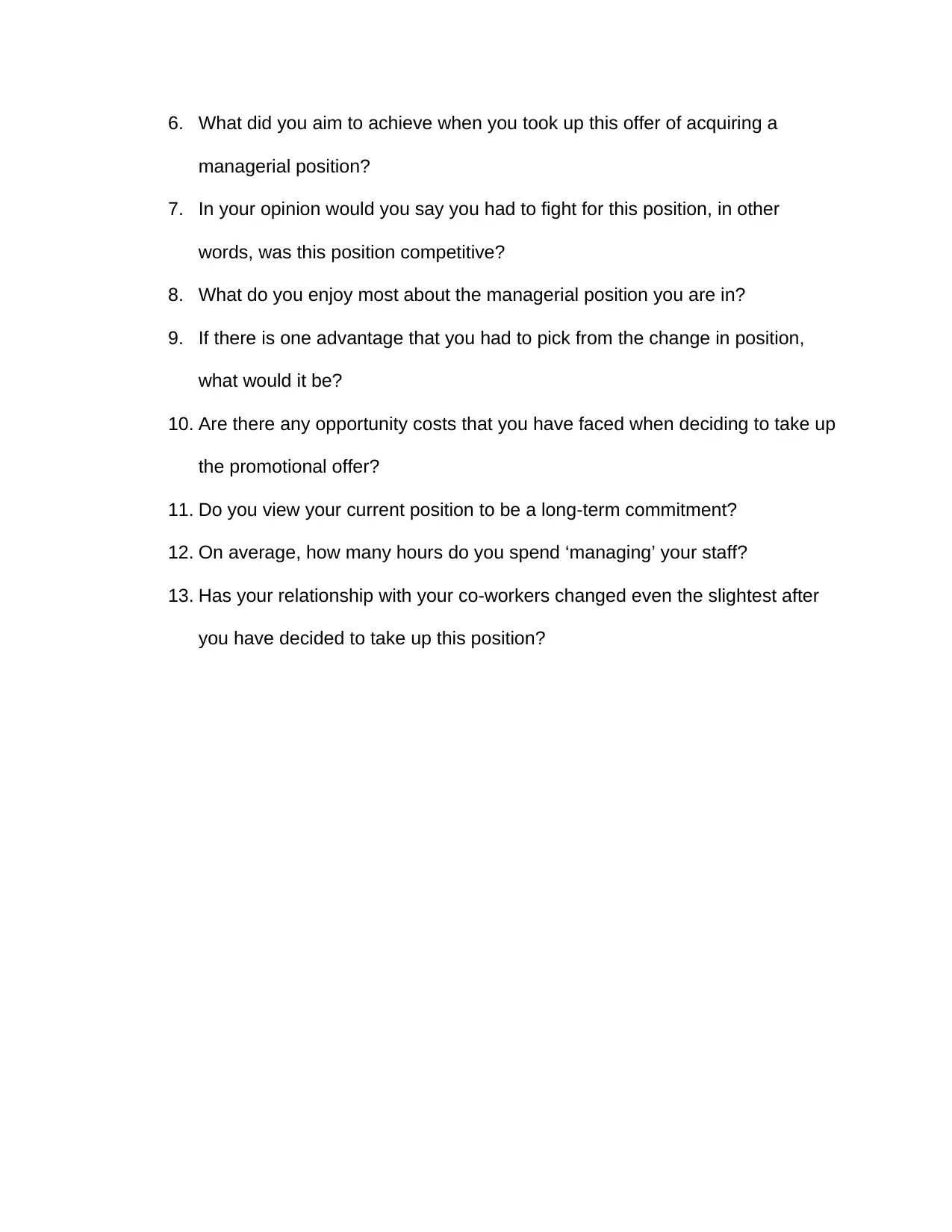
6. What did you aim to achieve when you took up this offer of acquiring a
managerial position?
7. In your opinion would you say you had to fight for this position, in other
words, was this position competitive?
8. What do you enjoy most about the managerial position you are in?
9. If there is one advantage that you had to pick from the change in position,
what would it be?
10. Are there any opportunity costs that you have faced when deciding to take up
the promotional offer?
11. Do you view your current position to be a long-term commitment?
12. On average, how many hours do you spend ‘managing’ your staff?
13. Has your relationship with your co-workers changed even the slightest after
you have decided to take up this position?
managerial position?
7. In your opinion would you say you had to fight for this position, in other
words, was this position competitive?
8. What do you enjoy most about the managerial position you are in?
9. If there is one advantage that you had to pick from the change in position,
what would it be?
10. Are there any opportunity costs that you have faced when deciding to take up
the promotional offer?
11. Do you view your current position to be a long-term commitment?
12. On average, how many hours do you spend ‘managing’ your staff?
13. Has your relationship with your co-workers changed even the slightest after
you have decided to take up this position?
Paraphrase This Document
Need a fresh take? Get an instant paraphrase of this document with our AI Paraphraser
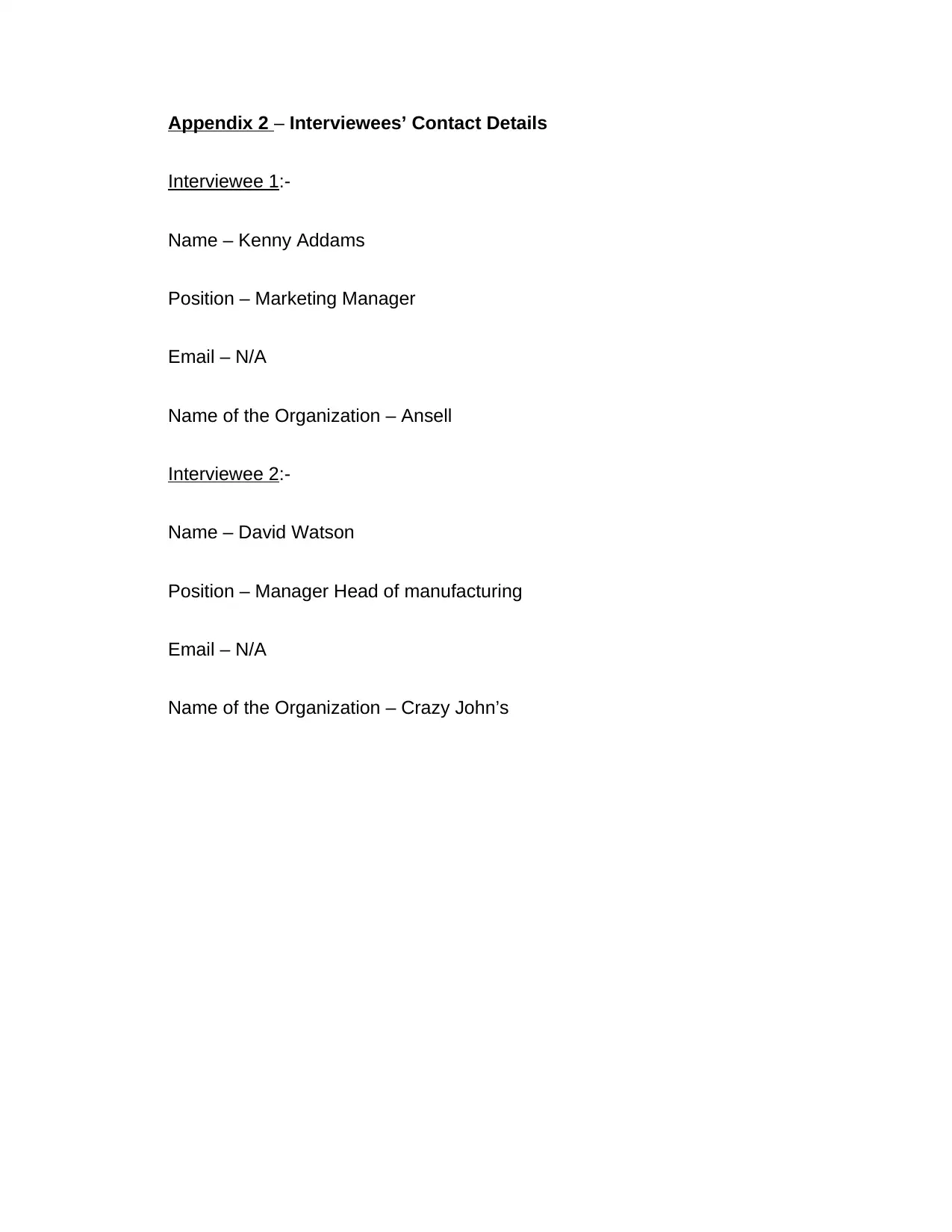
Appendix 2 – Interviewees’ Contact Details
Interviewee 1:-
Name – Kenny Addams
Position – Marketing Manager
Email – N/A
Name of the Organization – Ansell
Interviewee 2:-
Name – David Watson
Position – Manager Head of manufacturing
Email – N/A
Name of the Organization – Crazy John’s
Interviewee 1:-
Name – Kenny Addams
Position – Marketing Manager
Email – N/A
Name of the Organization – Ansell
Interviewee 2:-
Name – David Watson
Position – Manager Head of manufacturing
Email – N/A
Name of the Organization – Crazy John’s

⊘ This is a preview!⊘
Do you want full access?
Subscribe today to unlock all pages.

Trusted by 1+ million students worldwide
1 out of 12
Related Documents
Your All-in-One AI-Powered Toolkit for Academic Success.
+13062052269
info@desklib.com
Available 24*7 on WhatsApp / Email
![[object Object]](/_next/static/media/star-bottom.7253800d.svg)
Unlock your academic potential
Copyright © 2020–2026 A2Z Services. All Rights Reserved. Developed and managed by ZUCOL.





